- Home
- Blake Crouch
The Pain of Others Page 5
The Pain of Others Read online
Page 5
HW: Reading Desert Places and Locked Doors, it seems that you’re drawn to the horrific. The books are filled with horrific acts, and with terrifying set pieces, as in the descent into the Kites’ basement in Locked Doors. Did the horror genre hold any attraction to you growing up?
BC: I honestly didn’t read a lot of horror growing up, but I always loved the sensation of fear produced by a scary movie or a great book. Some of my first short fiction (written in middle school) could be classified as horror. In fact, there’s a short story on my website called “In Shock” that I wrote in the 8th grade.
HW: Might there be a sequel to Locked Doors someday?
BC: Midway through the writing of Locked Doors, it occurred to me the story might be a trilogy. I may finish out the trilogy at some point. I’m starting to miss my characters (the ones that survived), and I have a feeling that I will return to the world of Locked Doors at some point in the future to check in on them. We’ll have to see.
HW: Your latest novel, Abandon, is set in Colorado, where you’ve lived for the past six years. Did you intend to write a novel set in that state when you moved there, or did your surroundings inspire you to?
BC: This was definitely a case of my surroundings inspiring me. Two months after we moved from North Carolina to Durango, we had some friends come out to visit. My wife and I took them on a backpacking trip into the San Juans, and it was on this trip that I first saw the ruins of a mining town—Sneffels, Colorado and the Camp Bird Mine. It made a huge impression, the idea of living in these extreme conditions, particularly in winter. The claustrophobia, the desperation, the kind of people who would subject themselves to such a life fascinated me.
HW: Did you have any particular goals in mind when you embarked on this project? Did they change as you worked? Do you think you met your goals?
BC: The idea of writing a “mining town thriller” was with me for a long time, as early as the summer of 2003, before Desert Places was published. Initially, I thought it would all be set in the past, a straight historical. Then in ‘05, while on tour for Locked Doors, I had a sudden realization that this was the story I needed to write, and that it wasn’t just historical. There would be present scenes, too, and the mystery at the heart of the book would be the mass disappearance of the town. My goal was to write a book that I would want to read, and in that regard, I think I succeeded.
HW: How long did it take to prepare to write the book? How much research was involved? Do you research first, then write, or answer the questions that arise as you dive into the writing?
BC: I started outlining in the fall of ‘05, and finalized the book with my editor in the summer ‘07. There were 7 drafts, and tons of research, which occurred at all stages of the writing.
HW: Was it tough striking a balance between writing a thriller and the urge to display all your newfound knowledge? Any fascinating tidbits that didn’t go into the book that you want to share with readers?
BC: Lots of stuff got cut, and some of it was wonderful (and it still pains me to have let it go) but in the end, it was all about what advanced the story. For instance, there was an Irishman who lived in one of the Colorado mining towns, and the love of his life had died on their wedding night some years prior. Every night, from his cabin above town, the sound of a violin would sweep down the mountain. Mournful, beautiful music. The town got used to hearing it. One night, after the violin went silent, a single gunshot echoed from the cabin. The townsfolk went up and found him dead, with a note asking to be buried with his wife. I loved that bit, wanted to put this guy into the story, but it didn’t belong, so I had to let it go.
HW: Your first two books followed the adventures of basically the same cast of characters. Was it a relief or was it scary to move on to a whole new set of players?
BC: Both a total relief and completely terrifying. But what’s worse than the fear of doing something new and challenging is realizing one day that you’re in a rut, that you’ve essentially written the same book again and again.
HW: Your first two books could be described as pure, relentless adrenaline. In fact, those are your words. Was it difficult to work on a novel taking place in two different times, switching back and forth between the two? How about working with a larger cast? Did that present you with any particular challenges, issues, problems?
BC: It was hard at first, but once I got into the flow of both narratives, it wasn’t such a big deal to go back and forth, which is the way I wrote it. It sounds silly, but I wrote the present in one font, the past in another, and for some reason, changing fonts helped me to get back into whatever section I was working on. This cast of characters, which I knew was going to be big going in, was intimidating starting out. I spent a month on character studies, really getting to know each main character and their back-story before I dove into the book, and I think (I hope) that made all the difference.
HW: Has having children changed the way you look at your writing? Your subject matter? Do you ever pause and think, I guess my kids won’t be able to read that until they’re older?
BC: Abandon was the first thing I wrote after my son was born, and being a father for the first time and that new relationship and life-altering love couldn’t help but find its way into this work. Parent-child relationships definitely constitute a significant aspect of Abandon. And yeah, there’s no way my kids will be able to read my first two books until they’re at least seven or eight (kidding).
HW: Who is your first reader?
BC: My wife.
HW: What’s your favorite procrastination technique to avoid writing?
BC: Playing my acoustic guitar.
HW: Now that you’re in the business, do you find as much time to read as before? Do you avoid fiction for fear of unconsciously copying someone’s stories?
BC: I read more now than ever. You have to. I’ve never avoided fiction for fear of unconsciously copying someone else’s stories. You can’t help but be influenced by the work of others. No one is unique. As Cormac McCarthy said, “The sad truth is that books are made of other books.”
HW: I happen to know you’ve written an essay about Jack Ketchum’s Off Season for the upcoming International Thrillers Writers project Thrillers: 100 Must Reads. Was that format difficult for you? Did the experience provide you with any special insights into your own writings, or into thrillers in general?
BC: It was the hardest thing I’d written all year. I felt like I was in college again working on a term paper. That being said, it was a great joy to delve into the life and work of Jack Ketchum. I had great editors on that project. (HW: Full disclosure time: the editors for that worthy project are the esteemed David Morrell and yours truly. End of plug.)
HW: Tell us a little about future projects. You have a short story slated to appear in the ITW anthology, Thrillers 2?
BC: Yep, it’s called “Remaking” and also happens to be set in a beautiful Colorado town called Ouray. It’s premised on a question: What would you do if you were in a coffee shop, saw a man sitting with a young boy, and suspected the boy wasn’t supposed to be with him, that maybe he’d been kidnapped. I’m over the moon and humbled to be included in such a stellar collection of writers. Joe Konrath and I have just released a free short story as an eBook with the help of our publishers. It’s kind of groundbreaking, both in how Joe and I collaborated, and how our publishers came together to make it available everywhere. It’s called “Serial”, and is probably the most twisted thing either of us have ever written. The Abandon audiobook will have a short story that I read called “On the Good, Red Road,” and finally Jen Jordan’s new anthology, Uncage Me, publishes in July, and I have a story in that one called “*69.”
HW: Are you working on a new novel at the moment?
BC: I am.
HW: Where are you in that process?
BC: About a hundred pages in.
HW: Can you talk a little about the new book, or would that jinx things?
BC: I’m pretty sure I would deeply r
egret talking about it at this point. I find if I talk too much about works-in-progress, it takes the wind out of my sails.
HW: Any book recommendations?
BC: Joe Konrath just published a novel under the name Jack Kilborn. It’s called Afraid, and I think it’s one of the best pieces of horror fiction to come out in recent memory.
HW: Work uniform?
BC: A white tee-shirt and pajama bottoms with snowflakes on them. I know, it’s awful.
HW: Misconceptions about people who graduated from UNC?
BC: That if by some rip in the space-time continuum, Al-Qaeda managed to get a Division I college basketball team together, and if that team somehow made it to the NCAA tournament, and then survived March Madness, and, now here’s a real stretch, were facing Duke in the championship game on Monday night, that UNC fans would put aside their petty rivalry and root for Duke over the terrorists.
DESERT PLACES
Published in January 2004 by Thomas Dunne Books, available in the Kindle Store for $2.99
DESCRIPTION: Andrew Z. Thomas is a successful writer of suspense thrillers, living the dream at his lake house in the piedmont of North Carolina. One afternoon in late spring, he receives a bizarre letter that eventually threatens his career, his sanity, and the lives of everyone he loves. A murderer is designing his future, and for the life of him, Andrew can’t get away.
Harrowing...terrific...a whacked out combination of Stephen King and Cormac McCarthy.
PAT CONROY
[C]arried by rich, image-filled prose. Crouch will handcuff you, blindfold you, throw you in the trunk of a car, and drag you kicking and screaming through a story so intense, so emotionally packed, that you will walk away stunned.
WINSTON-SALEM JOURNAL
Excerpt from Desert Places…
On a lovely May evening, I sat on my deck, watching the sun descend upon Lake Norman. So far, it had been a perfect day. I’d risen at 5:00 a.m. as I always do, put on a pot of French roast, and prepared my usual breakfast of scrambled eggs and a bowl of fresh pineapple. By six o’clock, I was writing, and I didn’t stop until noon. I fried two white crappies I’d caught the night before, and the moment I sat down for lunch, my agent called. Cynthia fields my messages when I’m close to finishing a book, and she had several for me, the only one of real importance being that the movie deal for my latest novel, Blue Murder, had closed. It was good news of course, but two other movies had been made from my books, so I was used to it by now.
I worked in my study for the remainder of the afternoon and quit at 6:30. My final edits of the new as yet untitled manuscript would be finished tomorrow. I was tired, but my new thriller, The Scorcher, would be on bookshelves within the week. I savored the exhaustion that followed a full day of work. My hands sore from typing, eyes dry and strained, I shut down the computer and rolled back from the desk in my swivel chair.
I went outside and walked up the long gravel drive toward the mailbox. It was the first time I’d been out all day, and the sharp sunlight burned my eyes as it squeezed through the tall rows of loblollies that bordered both sides of the drive. It was so quiet here. Fifteen miles south, Charlotte was still gridlocked in rush-hour traffic, and I was grateful not to be a part of that madness. As the tiny rocks crunched beneath my feet, I pictured my best friend, Walter Lancing, fuming in his Cadillac. He’d be cursingthe drone of horns and the profusion of taillights as he inched away from his suite in uptown Charlotte, leaving the quarterly nature magazine Hiker to return home to his wife and children. Not me, I thought, the solitary one.
For once, my mailbox wasn’t overflowing. Two envelopes lay inside, one a bill, the other blank except for my address typed on the outside. Fan mail.
Back inside, I mixed myself a Jack Daniel’s and Sun-Drop and took my mail and a book on criminal pathology out onto the deck. Settling into a rocking chair, I set everything but my drink on a small glass table and gazed down to the water. My backyard is narrow, and the woods flourish a quarter mile on either side, keeping my home of ten years in isolation from my closest neighbors. Spring had not come this year until mid-April, so the last of the pink and white dogwood blossoms still specked the variably green interior of the surrounding forest. Bright grass ran down to a weathered gray pier at the water’s edge, where an ancient weeping willow sagged over the bank, the tips of its branches dabbling in the surface of the water.
The lake is more than a mile wide where it touches my property, making houses on the opposite shore visible only in winter, when the blanket of leaves has been stripped from the trees. So now, in the thick of spring, branches thriving with baby greens and yellows, the lake was mine alone, and I felt like the only living soul for miles around.
I put my glass down half-empty and opened the first envelope. As expected, I found a bill from the phone company, and I scrutinized the lengthy list of calls. When I’d finished, I set it down and lifted the lighter envelope. There was no stamp, which I thought strange, and upon slicing it open, I extracted a single piece of white paper and unfolded it. In the center of the page, one paragraph had been typed in black ink:
Greetings. There is a body buried on your property, covered in your blood. The unfortunate young lady’s name is Rita Jones. You’ve seen this missing schoolteacher’s face on the news, I’m sure. In her jeans pocket you’ll find a slip of paper with a phone number on it. You have one day to call that number. If I have not heard from you by 8:00 p.m. tomorrow (5/17), the Charlotte Police Department will receive an anonymous phone call. I’ll tell them where Rita Jones is buried on Andrew Thomas’s lakefront property, how he killed her, and where the murder weapon can be found in his house. (I do believe a paring knife is missing from your kitchen.) I hope for your sake I don’t have to make that call. I’ve placed a property marker on the grave site. Just walk along the shoreline toward the southern boundary of your property and you’ll find it. I strongly advise against going to the police, as I am always watching you.
A smile edged across my lips. I even chuckled to myself. Because my novels treat crime and violence, my fans often have a demented sense of humor. I’ve received death threats, graphic artwork, even notes from people claiming to have murdered in the same fashion as the serial killers in my books. But I’ll save this, I thought. I couldn’t remember one so original.
I read it again, but a premonitory twinge struck me the second time, particularly because the author had some knowledge regarding the layout of my property. And a paring knife was, in fact, missing from my cutlery block. Carefully refolding the letter, I slipped it into the pocket of my khakis and walked down the steps toward the lake.
As the sun cascaded through the hazy sky, beams of light drained like spilled paint across the western horizon. Looking at the lacquered lake suffused with deep orange, garnet, and magenta, I stood by the shore for several moments, watching two sunsets collide.
Against my better judgment, I followed the shoreline south and was soon tramping through a noisy bed of leaves. I’d gone an eighth of a mile when I stopped. At my feet, amid a coppice of pink flowering mountain laurel, I saw a miniature red flag attached to a strip of rusted metal thrust into the ground. The flag fluttered in a breeze that curled off the water. This has to be a joke, I thought, and if so, it’s a damn good one.
As I brushed away the dead leaves that surrounded the marker, my heart began to pound. The dirt beneath the flag was packed, not crumbly like undisturbed soil. I even saw half a footprint when I’d swept all the leaves away.
I ran back to the house and returned with a shovel. Because the soil had previously been unearthed, I dug easily through the first foot and a half, directly below where the marker had been placed. At two feet, the head of the shovel stabbed into something soft. My heart stopped. Throwing the shovel aside, I dropped to my hands and knees and clawed through the dirt. A rotten stench enveloped me, and as the hole deepened, the smell grew more pungent.
My fingers touched flesh. I drew my hand back in horror and scrambled awa
y from the hole. Rising to my feet, I stared down at a coffee brown ankle, barely showing through the dirt. The odor of rot overwhelmed me, so I breathed only through my mouth as I took up the shovel again.
When the corpse was completely exposed, and I saw what a month of putrefaction could do to a human face, I vomited into the leaves. I kept thinking that I should have the stomach for this because I write about it. Researching the grisly handiwork of serial killers, I’d studied countless mutilated cadavers. But I had never smelled a human being decomposing in the ground, or seen how insects teem in the moist cavities.

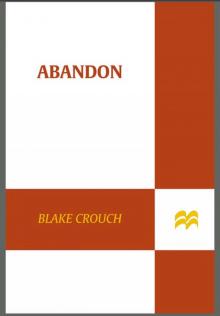 Abandon
Abandon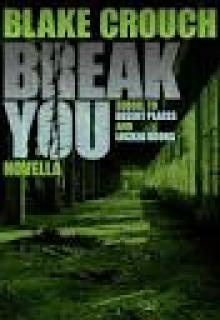 Break You
Break You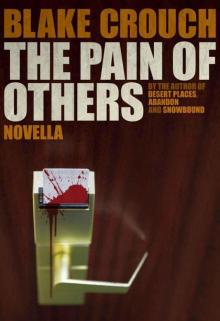 The Pain of Others
The Pain of Others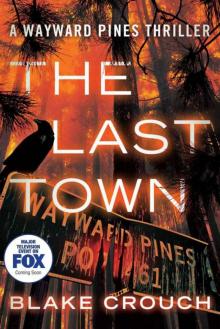 The Last Town
The Last Town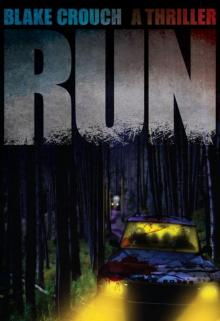 Run
Run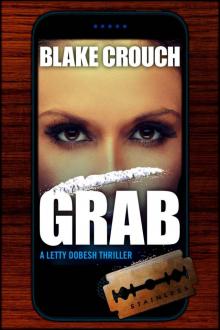 Grab
Grab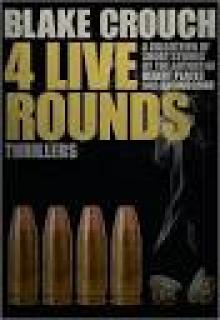 Four Live Rounds
Four Live Rounds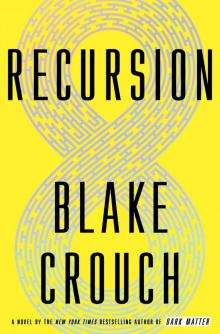 Recursion
Recursion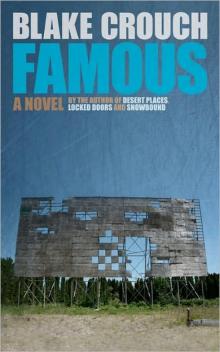 LUMINOUS BLUE: A Novel of Warped Celebrity
LUMINOUS BLUE: A Novel of Warped Celebrity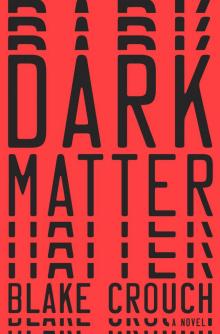 Dark Matter
Dark Matter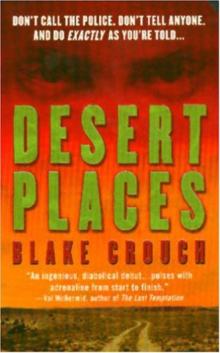 Desert Places
Desert Places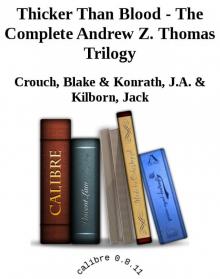 Thicker Than Blood - the Complete Andrew Z. Thomas Series
Thicker Than Blood - the Complete Andrew Z. Thomas Series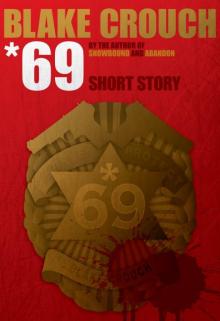 *69
*69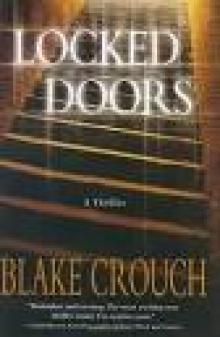 Locked Doors
Locked Doors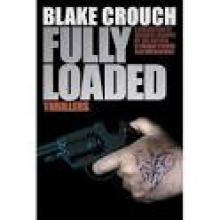 Fully Loaded Thrillers
Fully Loaded Thrillers![Summer Frost [Forward Collection] Read online](http://i1.bookreadfree.com/02/summer_frost_forward_collection_preview.jpg) Summer Frost [Forward Collection]
Summer Frost [Forward Collection]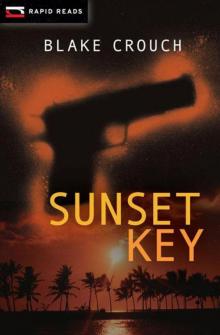 Sunset Key
Sunset Key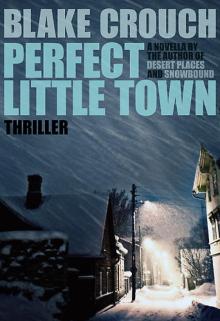 Perfect Little Town
Perfect Little Town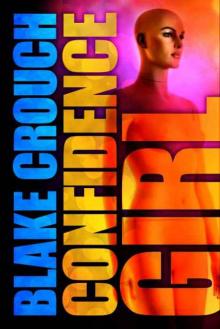 Confidence Girl
Confidence Girl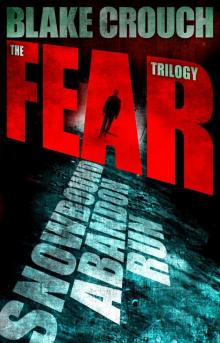 The Fear Trilogy
The Fear Trilogy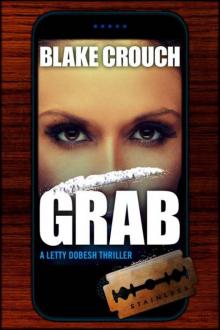 Grab ldm-3
Grab ldm-3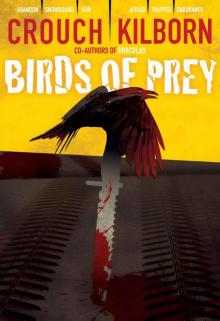 BIRDS OF PREY - A Psycho Thriller
BIRDS OF PREY - A Psycho Thriller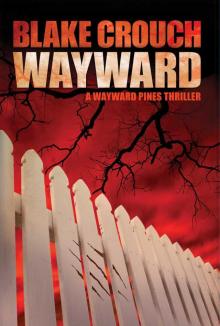 Wayward (The Wayward Pines Series, Book Two)
Wayward (The Wayward Pines Series, Book Two)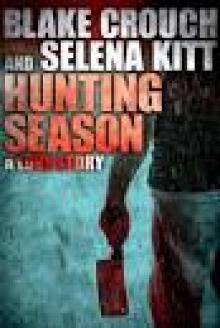 Hunting Season: A Love Story
Hunting Season: A Love Story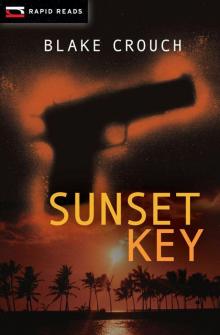 Sunset Key (Rapid Reads)
Sunset Key (Rapid Reads)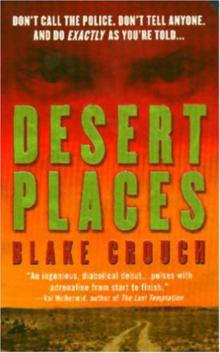 Desert Places: a Novel of Terror
Desert Places: a Novel of Terror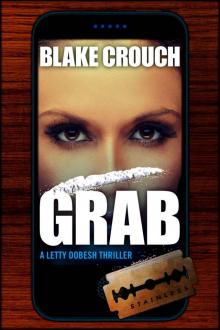 Grab (Letty Dobesh #3)
Grab (Letty Dobesh #3)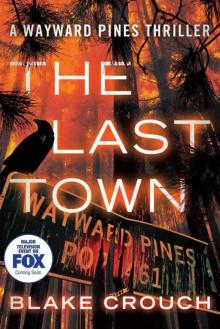 The Last Town (The Wayward Pines Trilogy 3)
The Last Town (The Wayward Pines Trilogy 3)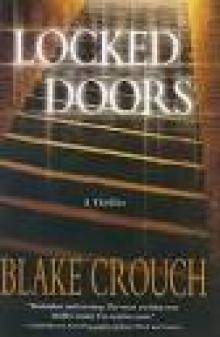 LOCKED DOORS: A Novel of Terror (Andrew Z. Thomas Thriller)
LOCKED DOORS: A Novel of Terror (Andrew Z. Thomas Thriller) BREAK YOU: A Novella of Terror (Prequel to Stirred) (Andrew Z. Thomas/Luther Kite)
BREAK YOU: A Novella of Terror (Prequel to Stirred) (Andrew Z. Thomas/Luther Kite)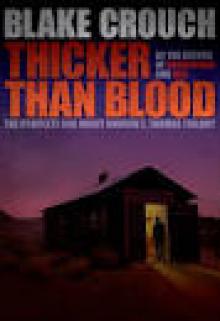 Thicker Than Blood - The Complete Andrew Z. Thomas Trilogy
Thicker Than Blood - The Complete Andrew Z. Thomas Trilogy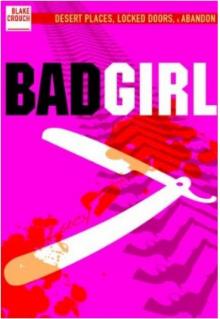 Bad Girl
Bad Girl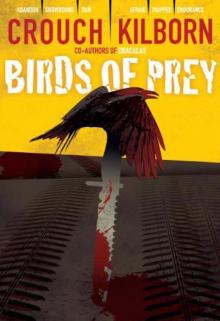 Birds of Prey
Birds of Prey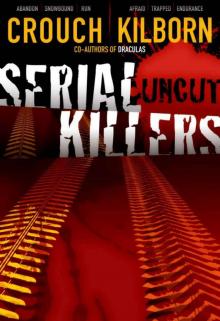 SERIAL KILLERS UNCUT - The Complete Psycho Thriller (The Complete Epic)
SERIAL KILLERS UNCUT - The Complete Psycho Thriller (The Complete Epic)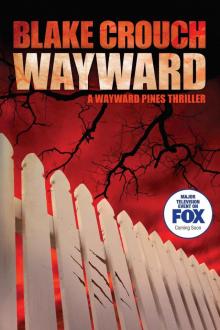 Wayward (The Wayward Pines Trilogy, Book 2)
Wayward (The Wayward Pines Trilogy, Book 2)